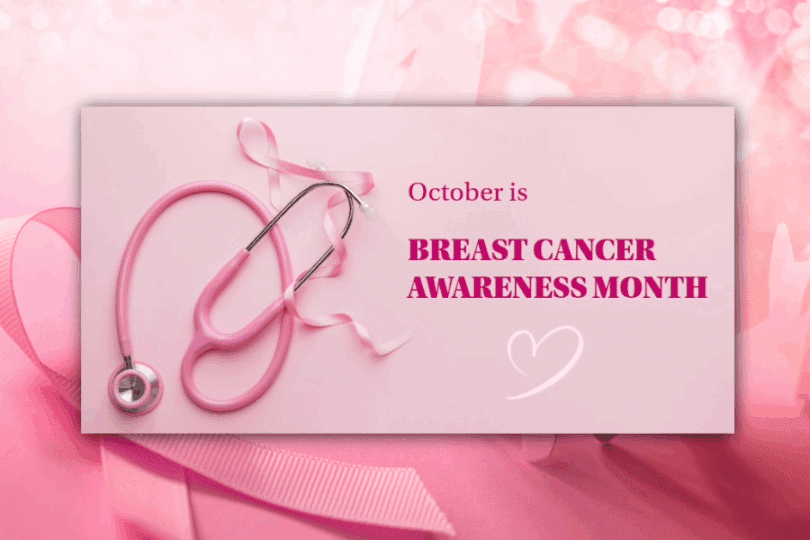Every October, people around the world unite to recognize Breast Cancer Awareness Month, a time dedicated to raising awareness, supporting those affected, and promoting education about one of the most common cancers among women. This annual observance serves as a reminder of how vital continued attention remains in the fight against breast cancer. Northern Arizona Healthcare (NAH) knows how important it is to provide breast care information to support the community in making the best choices for their breast health.
According to the Centers for Disease and Control Prevention (CDC), breast cancer is the second most common cancer in women, just behind lung cancer. That’s why early detection and screening are keys to saving lives. Breast Cancer Awareness Month is intended to educate the public about this disease, and the first step in taking care of one’s health is through preventive measures. The Cancer Centers of Northern Arizona Healthcare recommends that women aged 40 and older have an annual mammogram and continue to do so at the advice of their physician.
Early detection with mammography identifies tumors when they are very small, which increases survival rates and allows for less invasive treatment options. Women who have dense breast tissue may also need ultrasound or MRI imaging to better screen for breast cancer. NAH also reminds women to perform monthly self-breast exams, with the best time during the week after a menstrual period when hormone levels are lower and breasts are less tender, which makes lumps easier to detect. It is recommended for post-menopausal women to choose a consistent day each month.
It’s important for women to take control of their breast cancer risk by learning what lifestyle changes can help reduce that risk and improve health overall.
The American Cancer Society suggests these steps to help you stay well and lower your breast cancer risk:
- Be mindful of healthy eating: Pay attention to foods you eat daily and adding various colors to your food. Phytonutrients from colors provide health benefits such as antioxidant and anti-inflammatory effects that can lower the risk of cancer.
- Get to and stay at a healthy weight: Being overweight or obese is linked to an increased risk of breast cancer, so choose a lifestyle that will help you get to and stay at a healthy weight.
- Be physically active: Many studies have shown that moderate to vigorous physical activity is linked with lower breast cancer risk, so it’s important to get regular physical activity. It is recommended you maintain consistency, go slow and increase the level of exercise gradually, making sure to pay attention on how much your body can tolerate.
- Limit alcohol consumption: Alcohol increases the risk of breast cancer. It is best not to drink alcohol at all, but for women who do drink, they should have no more than one alcoholic drink a day. A drink is 12 ounces of beer, 5 ounces of wine or 1.5 ounces of 80-proof distilled spirits (hard liquor).
The Breast Health Program at the Cancer Centers of NAH is a cooperative program between the cancer patient and the team of breast cancer specialists working together toward optimal treatment outcomes and survival rates. Services provided through our program include individual treatment planning and coordination among all involved health care providers. At NAH, we use personalized treatment plans based on a patient’s tumor biology to neutralize cancers. This greater understanding of tumors allows us to perform less invasive surgeries, need less toxic chemotherapy agents and minimize radiation with focused beams. NAH’s nurse navigators also provide expert, compassionate support to guide patients through their complex treatment plans. Genetic testing is available for all patients at high risk with a personal history of breast cancer to help determine a treatment plan to prevent developing breast cancer. NAH partners with Cancer Support Community Arizona, which has a strong network of cancer support groups that can be helpful for patients navigating a cancer diagnosis.
Breast Cancer Awareness Month has consistently shown that awareness can save lives. By encouraging open conversations, promoting regular screenings, and supporting research, society takes one step closer to a future where breast cancer can be prevented.
Please note: The Arizona Daily Sun requires a subscription to access its articles.
If you are interested in submitting a question for Northern Arizona Healthcare, please email it to [email protected]. We will choose one question per month and one of our experts at NAH will answer the question in this column.
Reminder for the community: NAH will be hosting two public listening forums to hear the community’s thoughts on what would be the best use of the current Flagstaff Medical Center (FMC) campus, if and when the hospital relocates to a new location. The forums will be held on Oct. 29 from noon – 1 p.m. and Oct. 30 from 6 – 7 p.m. Both forums will be held in the McGee Auditorium on the FMC Campus.
